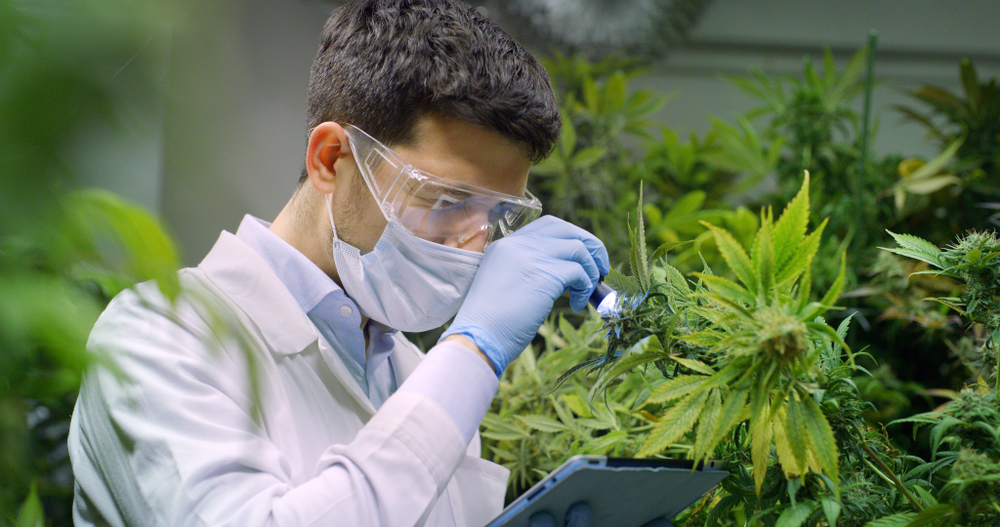The usual therapeutic arsenal in the management of Autism Spectrum Disorder (ASD) has clear limitations in terms of effectiveness and is often associated with important side effects. Cannabinoid derivatives, especially Cannabidiol, emerge as a promising pharmacological tool in this context, since clinical research demonstrates their safety and efficacy in controlling different groups of symptoms associated with ASD. Here, we are going to talk about the Endocannabinoid System mechanisms of action in this pathology and show how we can use cannabinoid derivatives, especially CBD, in Autism to achieve better results in these patients.
Endocannabinoid system and neuropsychiatric disorders
Researches regarding Endocannabinoid System (ECS) and the therapeutic properties of Cannabis have grown exponentially in the last decades, but there is still a lot to be unraveled about the ECS mechanisms in the main and most prevalent neuropsychiatric diseases such as como depression, disorders anxiety, Parkinson’s disease, Alzheimer’s and epilepsy.
With respect to Autism, it is not different, but the studies conducted so far show very promising results on the use of cannabinoids, such as CBD, in the treatment of said disorder. The ECS plays a key role in neurodevelopment and literature reviews such as this one bring together preclinical and clinical studies correlating the ECS mechanisms of action to the neuroinflammatory state that characterizes ASD.
>> You can read the full review here: Healing autism spectrum disorder with cannabinoids: a neuroinflammatory story.
Scientific findings reveal, for example, that blood levels of endocannabinoids such as anandamida (AEA) are lower in children with autism (compared to neurotypical children), indicating that an imbalance in the ECS functioning tone may be directly involved in this disorder etiology and/or progression. In this sense, the ECS modulation based on processes such as neuroinflammation, neurogenesis and cognitive functions (such as memory) indicates the potentially therapeutic action of cannabinoids.
No wonder, clinical studies show that behaviors such as self-injury and hyperactivity can be significantly reduced with CBD use. And very important, regarding the safety profile, he findings point out that CBD is an option very well tolerated by patients, without presenting relevant adverse effects, which often appear with other medicines used in these patients, such as antidepressants, antipsychotics and psychostimulants.
Check out more details below!
The use of CBD in autism
As scientific research evolves, new approaches to CBD use in autism emerge. An example is this systematic review conducted by the Federal University of Paraíba (UFPB) which brings studies regarding the use of cannabinoids for reducing the intensity and number of ASD symptoms, such as self-injury, hyperactivity, anxiety, aggression, psychomotor agitation and sleep disorders. The authors emphasize in this review the therapeutic property of CBD in changing the levels of glutamate, glutamine and GABA, which are substances that contribute to regulate the excitatory and inhibitory neurotransmission in both neurotypical and autistic subjects.
In addition, the research included in this review suggests an improvement in cognition, sensory sensitivity, attention, social interaction and language in ASD patients.
>> You can read the full review here: Cannabis and cannabinoid use in autism spectrum disorder: a systematic review.
It is also featured this study published by Frontiers in Pharmacology conducted with parents who give cannabinoids to their children with autism. We evaluated 53 children with a mean age of 11 years (4-22), who took CBD for an average of 66 days (30-588).
The results showed that episodes of self-injury and tantrums (n=34) improved in 67,6% of patients and worsened in 8,8%Hyperactivity symptoms (n=38) improved in 68.4% and worsened in 2,6%with no changes in 28,9% of the cases
Sleep-related issues (n=21) improved in 71,4% of patients and worsened in 4,7%Anxiety disorders (n=17) improved in 47,1% and worsened in 23,5%The research also showed that the most common adverse effects observed throughout the experiment were drowsiness and change in appetite, however, both with mild intensity.
>> You can read the full study here: Oral Cannabidiol Use in Children With Autism Spectrum Disorder to Treat Related Symptoms and Co-morbidities.
The pathophysiological mechanisms of Autism Spectrum Disorder (ASD) remain under investigation. The refractoriness of patients to conventional treatments remains one of the main challenges for the medical community in the management of this disorder and it drives us to seek better results in these patients. With the progress in the research on the Endocannabinoid System and medical Cannabis, many neurologists and psychiatrists are already aware of the importance of deepening their studies in this field and incorporating this important tool into their therapeutic arsenal.
A specialized education in the field is essential to improve technical knowledge and make safe and assertive prescriptions, enhancing therapeutic effects and modulating possible adverse effects from using CBD and other cannabinoid derivatives in Autism management..
The WeCann Academy is committed to your learning journey through International Certification in Endocannabinoid Medicine. We provide this disruptive knowledge to clinicians who want to incorporate cannabinoid derivatives into their prescriptive practice and improve their patient outcomes.
We connect experts from all around the world, with extensive prescriptive experience, in a global community of studies and research in Endocannabinoid Medicine, bringing together scientific knowledge and practical experience in the field.
Do you want to join our community? Contact us and get ready for this new frontier of Medicine!
References
Barchel D, Stolar O, De-Haan T, Ziv-Baran T, Saban N, Fuchs DO, Koren G, Berkovitch M. Oral Cannabidiol Use in Children With Autism Spectrum Disorder to Treat Related Symptoms and Co-morbidities. Front Pharmacol. 2019.
Carbone E, Manduca A, Cacchione C, Vicari S, Trezza V. Healing autism spectrum disorder with cannabinoids: a neuroinflammatory story. Neurosci Biobehav Rev. 2021 Feb;121:128-143. doi: 10.1016/j.neubiorev.2020.12.009. Epub 2020.
Silva EAD Junior, Medeiros WMB, Torro N, Sousa JMM, Almeida IBCM, Costa FBD, Pontes KM, Nunes ELG, Rosa MDD, Albuquerque KLGD. Cannabis and cannabinoid use in autism spectrum disorder: a systematic review. Trends Psychiatry Psychother. 2021.




